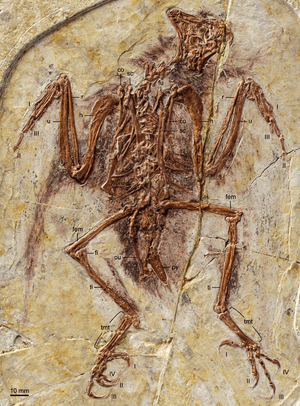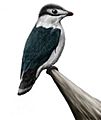Enantiornithes facts for kids
Quick facts for kids Enantiornitheans |
|
|---|---|
 |
|
| Fossil specimen of a bohaiornithid (Zhouornis hani) | |
| Scientific classification |
|
| Kingdom: | Animalia |
| Phylum: | Chordata |
| Clade: | Ornithothoraces |
| Clade: | †Enantiornithes Walker, 1981 |
| Subgroups | |
|
|
Enantiornithes is a group of extinct avialans ("birds" in the broad sense). They are the most abundant and diverse group known from the Mesozoic era.
Most had teeth and clawed fingers on each wing, but otherwise looked much like modern birds. Over 80 species of enantiornitheans have been named, but some names represent only single bones, so probably not all are valid species.
Enantiornitheans became extinct at the Cretaceous–Paleogene boundary, as did the hesperornithids and all other non-avian dinosaurs. The Enantiornithes are thought to have left no living descendants.
The name "Enantiornithes" means "opposite birds", from Ancient Greek enantios (ἐνάντιος) "opposite" + ornithes (όρνιθες) "birds" . The name was coined by Cyril Alexander Walker in a landmark paper which established the group. In his paper, Walker explained what he meant by "opposite":
Perhaps the most fundamental and characteristic difference between the Enantiornithes and all other birds is in the nature of the articulation between the scapula [...] and the coracoid, where the 'normal' condition is completely reversed.
This refers to an anatomical feature. The articulation of the shoulder bones has a concave-convex socket joint which is the reverse of the joint in modern birds.
Images for kids
See also
 In Spanish: Enantiornitas para niños
In Spanish: Enantiornitas para niños






